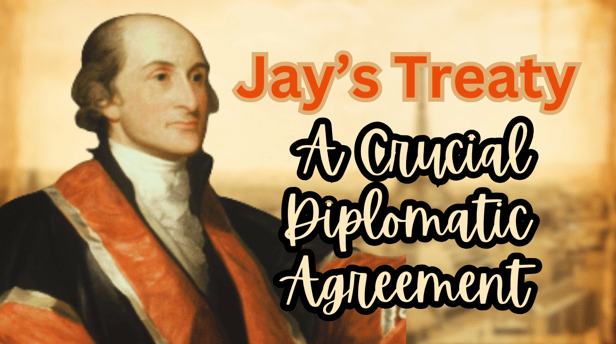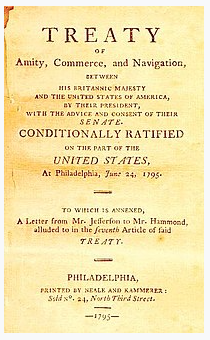Jay's Treaty: A Crucial Diplomatic Agreement
The Treaty of Amity, Commerce, and Navigation, commonly referred to as the Jay Treaty, was signed on November 19, 1794, between the United States and Great Britain. Named after its chief negotiator, John Jay, the treaty sought to resolve lingering issues from the 1783 Treaty of Paris, which ended the American Revolutionary War, and to avert another potential conflict between the two nations. Though it successfully maintained peace and fostered a decade of trade, the treaty also ignited intense political controversy and solidified the emerging divide between the Federalist and Democratic-Republican parties.
Casey Adams
11/25/20233 min read


Background: Tensions After the Treaty of Paris
Despite the Treaty of Paris formally concluding the Revolutionary War, numerous unresolved issues plagued U.S.-British relations. These included:
British Occupation of Northwest Territory Forts: Britain retained control of several forts in the Northwest Territory, defying the terms of the Treaty of Paris, and citing American violations of the agreement.
Debts and Loyalist Property: Many U.S. states had obstructed the repayment of debts owed to British creditors and continued to confiscate property from Loyalists, violating Articles 4 and 6 of the Treaty of Paris.
Maritime Disputes: The British Royal Navy frequently seized American ships and impressed American sailors, exacerbating tensions during the French Revolutionary Wars (1792–1802).
With the U.S. caught between Britain and France in their escalating hostilities, tensions threatened to escalate into another war.
Recognizing the dire need for diplomatic resolution, President George Washington and Treasury Secretary Alexander Hamilton turned to John Jay, then the Chief Justice of the United States, to negotiate a treaty with Britain.
Key Provisions of the Jay Treaty
The treaty addressed several of the United States' major concerns, though not without significant compromises:
1. British Withdrawal from Northwest Territory Forts
Britain agreed to vacate its forts in the Northwest Territory by June 1796, as stipulated in the Treaty of Paris, removing a major point of contention.
2. Debt and Property Disputes
Both nations agreed to arbitration to resolve disputes over:
Pre-war debts owed by Americans to British creditors.
Compensation for Loyalist property confiscated during the Revolutionary War.
3. Trade and Commerce
American merchants were granted limited access to trade with the British West Indies, though restrictions on U.S. exports of cotton were imposed.
The treaty facilitated ten years of peaceful trade between the two nations, crucial for the fledgling U.S. economy.
4. Maritime Issues
The treaty failed to secure an end to the British practice of impressment, a glaring omission that left many Americans dissatisfied.
5. Boundary Disputes
The treaty established a framework for resolving boundary disputes between the United States and Canada through arbitration, setting a precedent for future diplomatic negotiations.
Ratification and Political Controversy
The Jay Treaty was signed in November 1794 and submitted to the U.S. Senate for ratification in June 1795.
It passed by the narrowest possible margin—20 to 10, the exact two-thirds majority required.
The treaty's approval also required ratification by the First Pitt Ministry in Britain, which occurred soon after.
Opposition and Partisan Divide
The treaty deeply divided American public opinion and became a catalyst for the formation of the First Party System:
Federalists, led by Hamilton and Washington, supported the treaty as a pragmatic solution to avoid war and stabilize U.S. finances through trade.
Democratic-Republicans, led by Thomas Jefferson and James Madison, vehemently opposed it, arguing that the treaty:
Undermined American sovereignty by favoring British interests.
Alienated France, the U.S.’s ally during the Revolutionary War.
Strengthened Federalist dominance by fostering closer economic ties with Britain.
Public outrage ensued, with protests erupting across the country.
Efforts in the House of Representatives to block the treaty's implementation ultimately failed, as Congress lacked the constitutional authority to override a ratified treaty.
Impact of the Jay Treaty
The Jay Treaty had profound and lasting effects on U.S. foreign policy, domestic politics, and international relations:
1. Preservation of Peace
The treaty successfully averted war with Britain, allowing the United States to focus on domestic development during its formative years.
2. Economic Growth
By securing peaceful trade relations with Britain, the treaty bolstered the U.S. economy and provided much-needed revenue to the federal government.
3. Partisan Polarization
The intense debate over the treaty solidified the Federalist and Democratic-Republican parties, shaping the partisan landscape of early American politics.
4. Strained Relations with France
The treaty angered France, which viewed it as a betrayal of the Franco-American alliance.
This led to the Quasi-War (1798–1800), an undeclared naval conflict between the United States and France.
5. Legacy of Arbitration
The treaty's use of arbitration to resolve disputes set an important precedent for modern diplomacy.
Conclusion
The Jay Treaty stands as a pivotal moment in early American history, embodying the challenges of navigating diplomacy as a young nation.
Though it was deeply controversial and had significant shortcomings, it achieved its primary goal of maintaining peace with Britain.
Its impact on trade, politics, and foreign relations shaped the trajectory of the United States in its first decades of independence.
By steering the country through turbulent waters, the treaty underscored the importance of compromise and diplomacy in the face of division—an enduring lesson for future generations.



Jay's Treaty
John Jay

